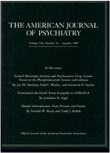Posttraumatic stress disorder as an insanity defense: medicolegal quicksand
Abstract
A growing awareness of posttraumatic stress disorder has led to recent use of the disorder as a legal defense against criminal responsibility for both violent and nonviolent crimes. Diagnosis of posttraumatic stress disorder is difficult because the symptoms are mostly subjective, often nonspecific, usually well publicized, and, therefore, relatively easy to imitate. Accurate psychiatric testimony in such cases requires diligent searching for collateral sources of information. The authors argue that the insanity defense is appropriate only in the rare instance that a dissociative episode related to posttraumatic stress disorder directly leads to criminal activity.
Access content
To read the fulltext, please use one of the options below to sign in or purchase access.- Personal login
- Institutional Login
- Sign in via OpenAthens
- Register for access
-
Please login/register if you wish to pair your device and check access availability.
Not a subscriber?
PsychiatryOnline subscription options offer access to the DSM-5 library, books, journals, CME, and patient resources. This all-in-one virtual library provides psychiatrists and mental health professionals with key resources for diagnosis, treatment, research, and professional development.
Need more help? PsychiatryOnline Customer Service may be reached by emailing [email protected] or by calling 800-368-5777 (in the U.S.) or 703-907-7322 (outside the U.S.).



